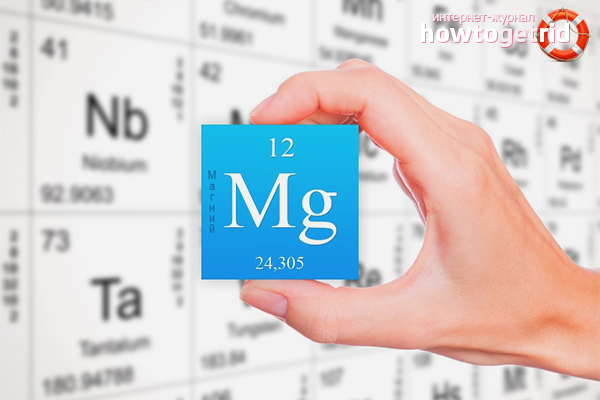The content of the article
The life of a modern woman is a run of squirrels, which is trying to be in time everywhere. Today, a woman must do everything if she wants to be competitive. Women go to work, along with men, look after the house, children, elderly parents. They cook, clean, wash and iron. In all this whirlpool of duties and necessary tasks, we forget about ourselves - our health and well-being. And we get in response to this reaction of the body in the form of constant fatigue, apathy, lack of interest in anything. That's enough, stop! It's time to stop and think about yourself beloved. Perhaps your poor health is due to a lack of magnesium in the body? Today we’ll talk about magnesium, why it is needed and what functions it performs, what symptoms indicate a deficiency of this microelement in the body, and what should be done to make up for the current deficiency.
Why does the female body need magnesium
Everyone knows that magnesium is vital for women. But how this need is manifested, for which organs magnesium is needed and in what processes it is involved, we will try to understand.
- Magnesium is an indispensable brick in building a healthy and strong nervous system. This trace element is responsible for tension and relaxation. With a lack of magnesium in the body, a woman constantly feels a sense of causeless anxiety, anxiety. With magnesium deficiency, the risk of depression increases dramatically.
- Magnesium is involved in electrolyte, energy and plastic metabolism, it is necessary in many biochemical reactions of the body.
- Magnesium is responsible for the work of the muscular system - namely, for the response of the neuromuscular teams.
- Since magnesium is responsible for the work of muscles, and the heart is the main muscle of the body, magnesium also affects the work of the cardiovascular system. The necessary amount of magnesium in the body allows the heart to beat rhythmically, eliminating the risk of heart attack and stroke.
- Magnesium, together with calcium, breaks down fats in the digestive system, lowering blood cholesterol. This makes the blood vessels more elastic.
- Magnesium is an essential trace element in building healthy tissue for teeth, hair and nails.
- Magnesium is involved in the synthesis and maintenance of female sex hormones. Thanks to a sufficient amount of magnesium, the woman’s menstrual cycle is improving, and the amount of female sex hormones (estrogens) is returning to normal. Magnesium is used in the treatment of various gynecological diseases.
- It is very important to monitor the amount of magnesium in the body during pregnancy. After all, he is involved in the laying of the bone, muscle, and nervous system of the fetus, a lack of magnesium can lead to all kinds of developmental pathologies.
- A sufficient amount of magnesium in the body is necessary for women after 50. During menopause, the absorption of calcium and magnesium decreases sharply, which increases the risk of osteoporosis. The necessary level of magnesium is needed in order to keep bones strong.
- Magnesium is also necessary for the absorption of calcium in the body.
- Since magnesium is responsible for muscle and nervous function, the intestine, namely its perilstatic, is another zone of responsibility of this microelement. Chronic magnesium deficiency can cause constipation.
- Magnesium controls some areas of brain activity - a lack of a trace element can lead to a decrease in the level of intellectual development, memory impairment, etc.
In addition to all this, magnesium is involved in the formation of immune cells, is responsible for blood supply to the kidneys, and helps to normalize carbohydrate metabolism. Magnesium is an indispensable element, without which the body simply can not do. Every day at least 300 mg of magnesium should be ingested. This is the average norm for an adult woman. In some cases, the need for magnesium increases by 30-40%. This usually happens during pregnancy and acute stress, during certain diseases of the kidneys, liver and heart. So how do you recognize the lack of magnesium in the body?
Symptoms of magnesium deficiency in women
The exact amount of magnesium in the body can be determined using analysis. But how to suspect a lack of magnesium by external signs?
- The first sign is chronic fatigue. Of course, if you work, you have an economy and three children, fatigue can be explained. But often women feel apathy and drowsiness in the morning, immediately after waking up. Such causeless fatigue can be a sign of a lack of magnesium in the body.
- Very often, a lack of magnesium leads to a decrease in female sex hormones. Outwardly, this is manifested by the absence or irregularity of the menstrual cycle.
- Another serious reason to suspect a lack of magnesium is various nervous disorders. With a deficiency of this element, a woman becomes irritable, tearful, depressive, she is constantly in a bad mood. Often this can be accompanied by a deterioration in sleep quality.
- A lack of magnesium affects the work of the muscle corset. A woman cannot be in one position for a long time, she feels weakness and lethargy in her legs, cramps, tingling and numbness in her limbs.
- Signs of vegetovascular disorders appear - a woman may feel sore and dizzy, soreness in her neck is felt, and a nervous tic can occur.
- In some cases, a lack of magnesium in the body is manifested by various disorders in the digestive tract. A woman feels nausea and vomiting; she has causeless diarrhea and diarrhea.
- Due to a decrease in immunity, fungal diseases are activated - candidiasis, onychomycosis, etc.
- In stressful situations, a woman may feel a lack of air.
- Magnesium deficiency is reflected in the work of the cardiovascular system. The patient may appear arrhythmia, blood pressure rises.
- There is an opinion that the severity of toxicosis depends on the amount of magnesium in the body. And if the deficiency of this microelement is high, then the toxicosis will be severe, with active vomiting and nausea.
- If a woman has a deficiency of magnesium in the body, she is more sensitive to weather. This can be manifested by headaches, pulling pains in the area of the bones during rain, wind and meteorite storms. In addition, with a lack of magnesium, a woman often experiences migraine attacks.
- In conditions of severe lack of magnesium, flickering silver lights may appear in front of a woman's eyes.
- Magnesium deficiency also affects the appearance of a woman - her nails and hair break, become weak and dull.
If you notice one of these signs, you need to consult with your doctor about your condition. Based on the examination, medical history and test results, the doctor will be able to confirm or refute the suspicion of a lack of magnesium in the body. If your condition is associated with this, you need to find out the causes of this deficiency.
Why there is a lack of magnesium in the body
The lion's dose of magnesium enters our body along with nutrition. Therefore, the lack of this trace element is largely associated with improper and unbalanced nutrition. If you consume a lot of canned foods and processed foods, the reason for the lack of magnesium is obvious. Magnesium is consumed in large quantities during stress.Naturally, you will need more magnesium during pregnancy to provide the micronutrient not only to yourself, but also to the baby’s body. Excess calcium in the body can inhibit the activity and absorption of magnesium. Often, magnesium deficiency is observed among residents in regions with a small amount of magnesium in drinking water. Overweight, a small amount of physical activity, bad habits, a sharp change in climate - all this can cause a lack of magnesium in the body. In this case, you need to take an additional dose of magnesium, which can be obtained with vitamins and food.
How to eliminate magnesium deficiency in the body
Take some measures and start drinking preparations containing magnesium, you need only after passing the tests. After all, acting at random can only worsen the situation. The fact is that calcium and magnesium are two trace elements that cannot be absorbed without each other, but tend to displace one another. If you take magnesium preparations uncontrollably, this can lead to an overabundance of this element, which will significantly reduce the amount of calcium. Moreover, an excess of magnesium also makes itself felt by symptoms such as lethargy, dry mouth, and a slow heartbeat.
If a magnesium deficiency is confirmed by tests, it is easiest to fill this deficiency with the help of special preparations. Among them are Magnelis B6, Magne B6, Magnesium Asparaginate, Bio-Magnesium, etc. Often, magnesium deficiency is accompanied by a lack of other vitamins and minerals. Therefore, it is best to drink not magnesium separately, but multivitamin complexes, which not only make up for the deficiencies of the necessary substances, but also help them digest.
Magnesium is one of the most important trace elements in the functioning of our body. He is involved in most chemical reactions. A lack of magnesium can lead to serious and unpleasant consequences. For example, a long-term deficiency of magnesium leads to a deterioration of the heart, this can result in a heart attack or stroke. Watch your body, because often it itself signals you about many failures in its work. If you feel unreasonable malaise, morning fatigue, disorders of the cardiovascular and nervous system, consult a doctor as soon as possible, it may be a lack of magnesium.
Video: lack of magnesium in the body - symptoms, treatment, prevention











Submit